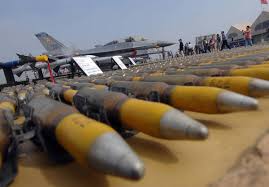
RNA - The growing availability of US arms has been a major factor in the increase in the number of conflicts in the Middle East and beyond. In modern conflicts and in places like Syria and Yemen, over 80 percent of all casualties have been civilian and 90 percent of these are caused by US arms and military support - with record profits for well-positioned US arms-makers on record sales to every ally on even sort-of good terms with the US.
Little wonder the US government is increasingly gauging its export success on weapons sales. Here, enough simply isn’t an option, as President Donald Trump is finalizing another policy guidance which will attempt to find major boosts to arms sales above and beyond what’s already been sent to region.
Efforts toward this end are ongoing, centering around making State Department officials public shills for US arms dealers, going to Persian Gulf conferences and shows to sell arms to allies like Saudi Arabia and the United Arab Emirates. The aim is to keep the regime-change wars and campaigns moving forward and to weaken any efforts toward peace and stability.
Mind you, the approval process for sales in the region is also too fast and too easy. The latest case in point could be President Trump’s recent visit to Riyadh during which he sold arms worth over $100 billion to the Saudis alone. In other words, there are no attempts to limit US arms exports to countries like Saudi Arabia despite their involvement in war crimes in Yemen and support for Takfiri-Wahhabi terrorists in Syria.
As a consequence of all this and more, the Middle East is plunging deeper into an arms race; a development that experts warn is fuelling serious tension and conflict in the region and beyond. This is because the Saudis and their allies are more prepared to use the weapons they are buying from the US and Europe for death and destruction than for fighting terrorism and extremism.
According to Fars News Agancy, with conflicts raging in Syria, Iraq, Libya and Yemen, the signs that the Trump administration is preparing to increase its arms sales – and supplies to the terror proxies in Syria – are raising fears that tensions will be stoked further still. In particular, Saudi Arabia is targeting Yemen for its regional ambitions where, despite the announcement by the United Nations that it is illegal and has caused huge human suffering, the US-made Saudi jets continue to strike civilian objects in close cooperation with American and British militaries.
Which brings us to the conclusion that the wars and the human sufferings will not go away as long as the US and Britain continue to sell arms to Saudi Arabia and other allies. But there has to be a way out:
Germany and Norway have already suspended exports of weapons and ammunition to Saudi Arabia and the United Arab Emirates over concerns they are being used in the war against Yemen, an unnecessary war that has killed more than 15,000 people and displaced more than 3 million.
Both the US and British governments should take responsibility and follow suit. Under International Law and International Humanitarian Law, they can and they should revoke all the existing export permits to their Arab allies and refrain from issuing any new licenses.
Under the current circumstances and in the face of repeated violations of International Humanitarian Law, the decision by the Trump White House to increase arms sales will only embolden Saudi Arabia and its coalition members that are active in the indiscriminate bombing of schools and hospitals in Yemen and weaponising various terror proxies in Syria. Ironically, all this unnecessary violence and bloodshed is for their regional ambitions and nothing more.
847/940